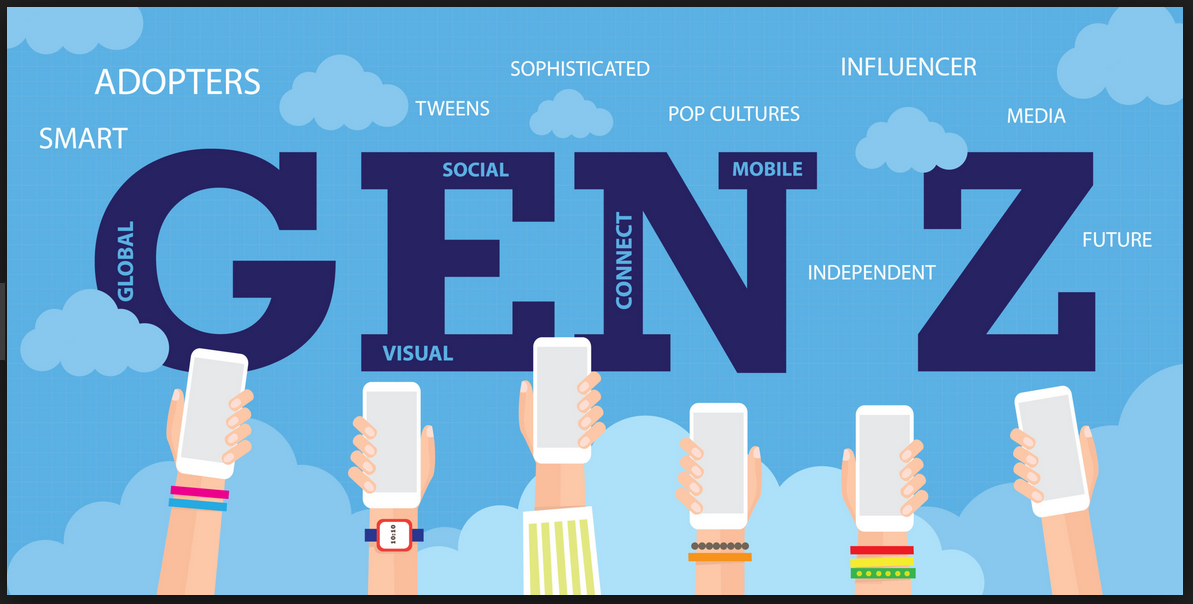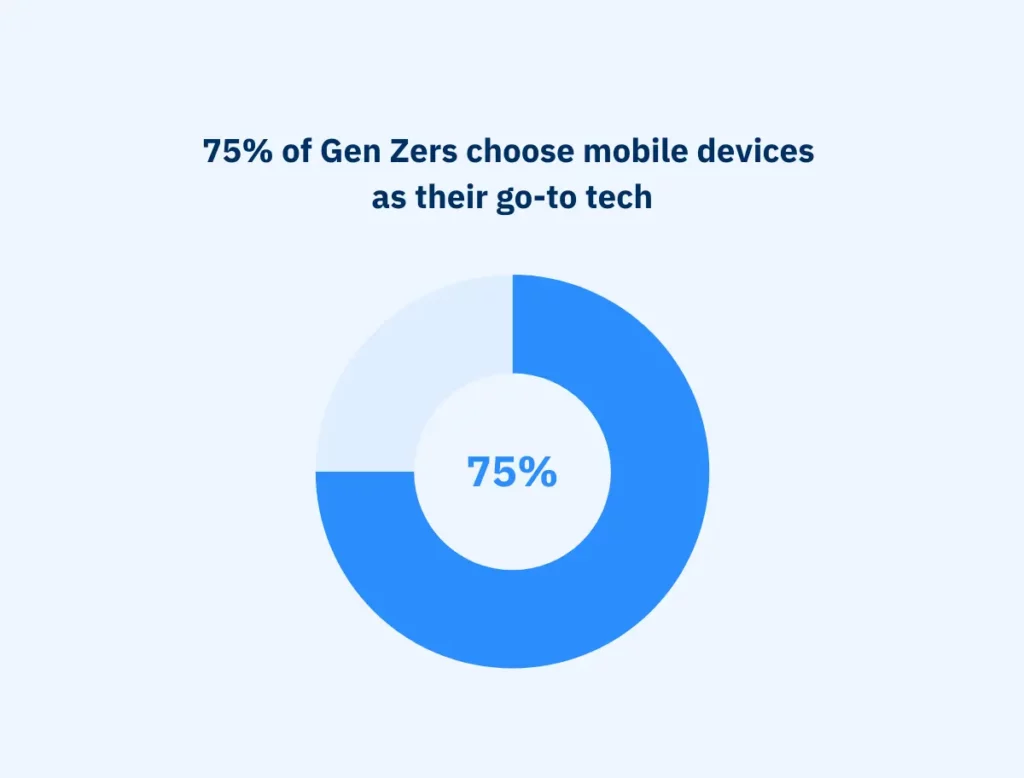
Gen Z (Gen Z Consumer Behaviors) is fundamentally transforming the landscape of marketing. This generation, born between 1997 and 2012, is the first to grow up immersed in technology, particularly smartphones and social media platforms like TikTok. By 2025, they are projected to constitute 27% of the global workforce, indicating their growing impact on consumer behavior and spending habits.
Gen Z Consumer Behaviors

However, engaging Gen Z requires more than just trendy content or appealing aesthetics. This demographic is discerning, prioritizing authenticity and values in their interactions with brands.
They are quick to dismiss companies that fail to present genuine messages or align with their principles. To effectively connect with Gen Z, marketers must delve into their motivations and preferences, ensuring that their strategies resonate on a deeper level. Understanding what drives this generation is crucial for brands aiming to capture their attention and loyalty.
Understanding Gen Z requires recognizing that their online interactions are intentional and value-driven rather than impulsive. This generation is characterized by a deliberate approach to social media and shopping, reflecting their curiosity and strong connection to personal values.
Research conducted by Later’s in-house team reveals critical insights into Gen Z behavior, gathered through direct interviews and surveys. These findings highlight the importance of engaging with Gen Z on their terms, emphasizing the need for brands to align with their values and interests. By doing so, businesses can effectively connect with this influential demographic and foster meaningful relationships.
To successfully reach Gen Z, it is essential to appreciate their thoughtful engagement and to create content and experiences that resonate with their values. This approach not only enhances brand loyalty but also positions businesses to thrive in a rapidly evolving market.
1. Social Media is Where They Live, and Love to Learn
Generation Z has seamlessly integrated social media into their daily lives, treating platforms like TikTok, Instagram, and YouTube as essential environments for various activities. These platforms serve not only as sources of entertainment but also as vital spaces for learning and personal development.
Through engaging content, Gen Z discovers new brands and products, making social media a modern shopping mall. Additionally, the abundance of “how-to” tutorials available on these platforms transforms them into informal classrooms, where users can acquire new skills and knowledge. This multifaceted use of social media highlights its significance in shaping the experiences and behaviors of this generation.
Stats:
Research indicates that a significant majority of Gen Z dedicates a substantial amount of time to social media, with 73% spending between 3 to 5 hours each day. This engagement is primarily concentrated on three key platforms.
Instagram stands out as a daily favorite, with 71% of Gen Z users logging in every day and 62% checking their accounts multiple times throughout the day. TikTok has also captured the attention of this demographic, with 73% interacting with the platform daily, positioning it as a central hub for viral trends and entertainment. Lastly, YouTube enjoys near-universal usage among Gen Z, with only 2% of this group not utilizing the platform at all.
These insights highlight the critical role social media plays in the daily lives of Gen Z, emphasizing the importance of these platforms in shaping their social interactions and cultural trends.
What Works:
In today’s digital landscape, snackable content that is both entertaining and educational is essential for capturing audience attention. Platforms like TikTok, Instagram Reels, and YouTube Shorts are ideal for delivering quick, engaging snippets that resonate with viewers. These short-form videos are effective in creating initial interest and drawing in potential customers.
However, to foster deeper engagement and build a stronger connection with your audience, longer formats such as tutorials or product reviews on YouTube are invaluable. These in-depth videos allow for a more comprehensive exploration of topics, providing viewers with the information they need to make informed decisions. By strategically utilizing both short and long-form content, brands can effectively engage their audience at different stages of the customer journey, ultimately enhancing their overall impact and reach.
2. Influencers Are Their Shopping Buddies
Gen Z places significant value on influencer recommendations, but this trust hinges on the authenticity of the influencer. They perceive influencers not merely as marketers but as trendsetters and educators who provide genuine insights. This generation seeks inspiration and entertainment from influencers, yet they are quick to disengage if they sense inauthenticity. For Gen Z, authenticity is not just a preference; it is a fundamental expectation that shapes their engagement with influencers.
READ ALSO: Kweku Smoke Set to Headline His Maiden Event, “The Revival,” in Accra
Stats:
The research highlights significant trends among Gen Z, revealing that a substantial 58% of this demographic follows influencers primarily for entertainment purposes. This indicates that influencers play a crucial role in shaping the entertainment landscape for younger audiences. Additionally, 49% of Gen Z members depend on influencers as a key source for discovering new products. This reliance underscores the importance of influencers in driving consumer behavior and product awareness within this generation. Overall, the findings suggest that influencers are not only entertainers but also vital conduits for product discovery among Gen Z.
What Works:
Partnering with influencers who genuinely resonate with your brand and audience is crucial for effective marketing. It is essential to focus on creators who prioritize authentic connections with their followers, as this fosters trust and engagement. For Gen Z, authenticity is paramount; they are more likely to respond positively to influencers who truly use and believe in the products they promote. This alignment not only enhances brand credibility but also strengthens the relationship between the influencer and their audience, leading to more impactful marketing outcomes.
3. Shopping is About Values (Not Just Deals)
Gen Z approaches shopping with a deeply personal perspective, prioritizing alignment with brands that resonate with their values and ethics. For this generation, the shopping experience transcends mere price and convenience; it is fundamentally about the principles that brands embody.
Sustainability, inclusivity, and a commitment to social causes are critical factors influencing their purchasing decisions. Gen Z demands transparency and accountability from brands, seeking assurance that companies not only advocate for these values but also actively implement them in their practices. This generation is not just looking for products; they are looking for partnerships with brands that reflect their beliefs and contribute positively to society.
Stats:
Gen Z is increasingly seeking brands that reflect their values, particularly in areas such as sustainability and inclusivity. This generation prioritizes ethical alignment in their purchasing decisions, making it essential for brands to demonstrate their commitment to these principles.
Recent research indicates that over half of Gen Z, specifically 53%, has experienced a phenomenon known as “de-influencing” in the past year. This trend highlights the importance of transparency in marketing and brand communication, as consumers are becoming more discerning about the messages they receive.
Additionally, Gen Z tends to shy away from shopping directly through social media platforms. Instead, they prefer to visit brand websites, which they perceive as more credible and trustworthy. This behavior underscores the need for brands to enhance their online presence and ensure that their websites effectively communicate their values and offerings.
What Works:
Honest storytelling is essential for effectively communicating your brand’s values and actions. By sharing authentic narratives, you can build trust and foster a deeper connection with your audience. Emphasizing your commitment to sustainable practices not only showcases your responsibility towards the environment but also resonates with consumers who prioritize eco-friendly choices.
Inclusivity is another critical aspect to highlight; demonstrating that your brand values diversity can attract a broader customer base and enhance brand loyalty. Additionally, showcasing your efforts in giving back to the community reflects a sense of social responsibility, which can significantly enhance your brand’s reputation. Overall, these elements of storytelling not only differentiate your brand but also create a compelling narrative that engages and inspires your audience.

4. Fashion is Their Canvas
Gen Z views fashion as a vital form of self-expression rather than merely a means to look good. Their purchasing behavior emphasizes individuality, sustainability, and the creative remixing of past trends, often seen in the popularity of thrift shopping. This generation approaches fashion as a creative playground, seeking brands that align with their values by offering innovative and inclusive products. Brands that understand and cater to these preferences will resonate more deeply with Gen Z consumers.
Stats:
Thrifting and upcycling have gained significant popularity, largely influenced by social media platforms such as TikTok and Depop. These platforms have created a vibrant community that promotes second-hand shopping and creative repurposing of clothing, appealing to environmentally conscious consumers.
Brands like Zara and H&M are responding to the evolving fashion landscape by introducing gender-neutral collections. This shift reflects Gen Z’s strong preference for inclusivity and diversity in fashion, allowing individuals to express their identities without the constraints of traditional gender norms.
Sustainability has become a fundamental expectation for many in Gen Z. This generation prioritizes eco-friendly practices and seeks out brands that align with their values, making sustainable fashion a crucial aspect of their purchasing decisions.
What Works:
The text emphasizes the importance of offering customizable and eco-friendly options that resonate with the values of today’s consumers, particularly Gen Z. It highlights the need for inclusivity in product offerings, ensuring that diverse perspectives and needs are met. Collaborating with creators who share these values is crucial, as they can effectively communicate and connect with Gen Z’s desire for individuality. By aligning with these principles, brands can foster a deeper connection with their audience and enhance their market appeal.
5. Entertainment is Non-Negotiable
Gen Z has a strong aversion to boredom, which significantly influences their engagement with brands. This generation seeks entertainment, surprise, and humor in their interactions, particularly on platforms like TikTok and YouTube. Brands that can effectively incorporate these elements into their marketing strategies are more likely to capture the attention and loyalty of Gen Z consumers. Ultimately, the key to resonating with this demographic lies in making marketing fun and engaging.
Stats:
Research indicates that Generation Z primarily utilizes social media for entertainment, surpassing the usage patterns of Millennials, Generation X, and older demographics. This trend highlights a significant shift in how younger audiences interact with digital platforms.
Furthermore, the findings reveal that content designed to go viral, particularly humorous or unexpected material, captures Gen Z’s attention three times more effectively than conventional advertisements. This suggests that brands need to rethink their marketing strategies to resonate with this audience.
Additionally, Gen Z shows a higher level of engagement with brands that effectively integrate cultural moments, popular memes, or trending audio into their content. This insight underscores the importance of staying relevant and connected to current trends to foster meaningful interactions with this generation.
What Works:
To effectively engage with Gen Z, brands must embrace humor and incorporate pop culture references into their marketing strategies. This generation appreciates content that is light-hearted and relatable, often expressed through clever tweets or engaging TikTok challenges. By adopting a playful tone and interactive formats, brands can foster a genuine connection with Gen Z consumers, who are drawn to those that exhibit authenticity and a sense of fun. Ultimately, the key to capturing their attention lies in not taking oneself too seriously, allowing for a more approachable and engaging brand image.
Winning Gen Z’s Heart (and Loyalty)
Marketing to Gen Z requires a focus on values, creativity, and authenticity rather than merely following trends. This generation seeks brands that resonate with them, making them feel acknowledged and inspired. Engaging content, such as entertaining TikToks, alongside genuine commitments to sustainability, is crucial for capturing their attention.
For marketers, this presents a unique opportunity to innovate and forge meaningful connections with Gen Z. By prioritizing these elements, brands can effectively engage with a generation that is reshaping the marketing landscape. Embracing this approach is essential for establishing lasting relationships with Gen Z consumers…
Did You Find This Article Helpful? Let Us Know In The Comment Section




